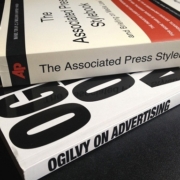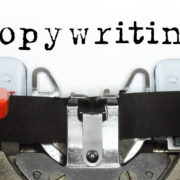Copywriting do’s and don’ts (Pt II – the don’ts)
In the second part of our ‘Copywriting do’s and don’ts’ here, rather predictably, are five copywriting don’ts. Actually there are six (which ironically probably breaks the most important rule: Follow the brief! Oh well, rules are there to be broken.)
Table of Contents
1. Don’t: settle for the first thing you think of.
Depending on which copywriter you talk to, the general advice is to come up with somewhere between fifty and a hundred ideas before you even begin to think about working one up in more detail. And even when you get an idea you really like, don’t settle for it as it is. Push it further. And further still. Then move on to another one because you can always come back to that ‘good’ one later.
Sure, between fifty and a hundred sounds like a lot but you’ll be surprised at how much stuff you can think of when you really try. Just scribble headlines down on a big sheet of paper, doodle or draw pictures, whatever it takes to translate what’s going on in your brain into something readable.
The thing is, anyone can come up with a headline that sounds nice or has a double meaning. Everyone has accidentally stumbled on a word play that they thought would be perfect for such and such a product. They briefly feel like a copywriter. But the real copywriter takes that neat word play and asks: “Is this saying what I want it to say? Is it getting across a message? And (most importantly) will it make people want to buy?”
One more thing. When your job has finally gone to print or has been put online at last (or whatever) try thinking back to what your original, first thought was. Then invariably you’ll see it for what it really was.
2. Don’t: use clichés.
It kind of goes without saying that clichés are bad things. But why exactly? What is wrong with using language that everyone understands? Well, here’s the thing. Clichés are clichés because they have been overused. And because they are overused they begin to lose their impact – if not their very meaning. When someone reads “It’s like water off a duck’s back” or “It’s easy as falling off a log” the actual meaning of the words no longer register in their mind. Instead there’s just a vague feeling of “easiness” but phrases like this don’t conjure up evoke an actual image of droplets of water rolling like mercury over oily feathers anymore.
And if your words aren’t working hard you’ve got a problem because generally you need to get your message across as quickly as possible and in as few words as possible. Redundancy just slows things down. It’s so much better to come up with new ways to express common ideas. It not only makes your writing sound fresher but will keep the reader on his or her toes. By forcing them to use their imagination you are getting them to really engage with the copy and, after that, they’ll be like putty in your hands. (Doh!)
3. Don’t: miss deadlines.
Any piece of advertising whether it’s an ad, a brochure or a radio script has to go through a lot of stages from conception to realisation. One delay tends to cause another and before you know it the whole project is way over budget and everyone starts looking for someone else to blame. So do your bit by doing what you said you were going to do when you said you were going to do it by.
It’s not just the final deadline for a client presentation we’re talking about here. Get into the habit of meeting internal deadlines in an agency or even the personal deadlines you set yourself as a freelancer. Actually, there’s nothing like a bit of time pressure to get you thinking more clearly so they can, in fact, be a blessing in disguise. Many’s the time when a job with the proverbial “crazy deadline” ends up with a cracking idea simple because everyone was forced to up their game.
4. Don’t: get upset.
The trouble with writing is that everyone thinks they can do it. So clients feel very comfortable criticising or even changing a copywriter’s work in a way that they wouldn’t dream of doing with the art director’s efforts. Most people can’t draw so they’ll leave that up to the ‘expert’ but the words, oh, that’s a different thing all together.
You have to learn to deal with it. If you say No to every change you’re going to seem inflexible and difficult to work with which isn’t good for a long term working relationship. But, on the other hand, there’s a reason why you wrote the copy the way you wrote it so sometimes you need to pipe up and explain why that certain word or sentence has to stay. See it as a trade-off. Let the things that don’t really matter go but be prepared to dig in your heels on the important ones.
Generally, advertising is a terribly subjective business which often comes down to personal opinions (or personal prejudices). So when you present work to either a suit, a creative director or a client you’re opening yourself up every time to criticism. Remember: It’s not personal, it’s business. Although it can hurt a bit to have your ideas rejected that’s just the name of the game and it happens to everyone. You can’t afford to get upset about it. Just move on, keep positive and get back in the saddle.
5. Don’t: forget to get work samples.
It’s so important for every copywriter, whether freelance or in an agency, to build up a portfolio of work they’ve done. It’s their ticket to more or better work in the future. But it’s all too easy to lose track of projects – especially as a freelancer who isn’t on site all the time. Once the copy is approved there’s still a long way to go to final artwork or publication by which time you’ll be busy with other work (hopefully!).
It’s a good idea to keep a list of work in progress and regularly remind the account exec that you’ll need a sample when it’s ready. Ideally you want to get pdfs too so you can email samples to prospective clients/employers in the future. (Handy tip: ask whoever’s making the pdfs to remove the crop marks and to give you a clean copy of the work.)
PS. One extra one: Don’t ever say ‘advert’. Ever.
It’s ‘ad’ or ‘advertisement’ but never ‘advert’. ‘Advert’ is what your mum might say.









